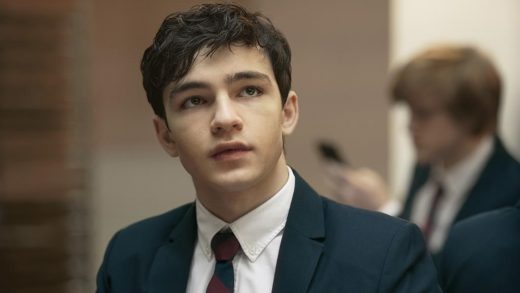Rhythm of dramatic comedy ebbs and flows

It’s safe to say that Royal Manitoba Theatre Centre’s local première of Dorothy Dittrich’s The Piano Teacher will strike a chord with many as a tale about surviving the unimaginable.
However, the gently told, two-hour drama/comedy (with intermission) that opened Thursday at the Tom Hendry Warehouse will also resonate as an ode to the power of music itself.
The three-hander, directed by Winnipeg’s Simon Miron and featuring an all-local cast, tells the story of Erin (Gwendolyn Collins), a celebrated concert pianist paralyzed by grief after tragically losing her violinist husband and young son two years prior.
DYLAN HEWLETT PHOTO
Erin (Gwendolyn Collins) falls for good-guy handyman Tom (Chris Sousa).
She reaches out to Elaine (Jane Testar), an unconventional piano teacher who clumps around in clogs, for lessons as she seeks to reclaim her hijacked life.
One of the best things about this show — which garnered the Governor General’s Award for English-language drama in 2022, its title then appended with In a Healing Key — is its score, meticulously created by sound designer Justin Stadnyk.
Dittrich — a musician herself who was in attendance opening night — clearly knows her way around the classical canon. An impressive playlist of musical chestnuts by such composers as Haydn, Beethoven and Bartok underscores the actors’ dialogue throughout both acts, and magically bleeds from Testar and Collins’s live performance on a baby grand piano positioned centre stage to a recorded soundtrack.
Also included are snippets of late Canadian jazz legend Oscar Peterson and Copland’s Appalachian Spring, with a few Tin Pan Alley tunes thrown in for good measure.
Kudos to both artists — especially to Testar for white-knuckling her way through Beethoven’s knotty Moonlight Sonata — for adding all-critical verisimilitude.
Elaine also delivers a matter-of-fact series of monologues about the nature of music and life that are interlaced throughout the narrative, although platitudes such as when you “play from the heart, you can actually say something” are not exactly rocket science.
However, one of her earliest lines — “I am a piano teacher. You’ve come for a lesson. Why?” — neatly sums up the play’s ethos, while speaking to an artist’s blinkered drive toward excellence.
Effective visual counterpoint is created when Elaine quietly observes Erin from set designer Shauna Jones’ hyper-saturated, creativity-sparking living room, as her pupil shuffles through her own coldly barren, dangerously multi-levelled home, lit in antiseptic white hues by designer jaymez, with the grand piano visually linking their abodes.
DYLAN HEWLETT PHOTO
Erin (Gwendolyn Collins, left) relearns to play the piano from Elaine (Jane Testar) after losing her family.
However, it’s odd that Elaine remains in the same black and white frock, created by costume designer Joseph Abetria, while Erin in her more prosaic blue jeans at least gets to switch out a series of sweaters and jackets denoting the passage of time.
As the two women’s friendship grows, so does Erin’s confidence, though she never really moves beyond her initial, awkwardly halting speech patterns to make us believe she’s a full flesh-and-blood mortal struggling with the trauma of grief. More dimension and subtext would have been welcome; Collins’ broad-strokes backstory is as razor thin as a skeletal triad. We never really do feel why music is so important to her.
Testar fares better as Elaine, soothing her pupil with literal tea and sympathy. Her pain over relinquishing her own performance career after developing crippling arthritis felt raw and real, although why exactly she “panicked” after her diagnosis is never made clear.
Erin does discover love again, thanks to Chris Sousa, in his RMTC debut, as salt o’ the earth handyman Tom, hired to install a window that brings both literal and clunky, figurative light into her home.
His first entrance, accompanied by Bartok’s Romanian Folk Dances, makes him appear strangely exotic (“a man!”), but the sharing of his rather thin story about his familial wounds helps Erin along her healing journey, as they play benign games of Scrabble together and (tepidly) make out.
The biggest problem is that a lot of this play simply falls flat, losing its rhythm in the process. Several plot developments leap ahead without connecting narrative glue, and gaping holes weaken the overall structure.
There’s a musical style called pointillism, in which melodic material reveals itself through single, isolated notes like falling snowflakes, and this show is much like that. There is precious little dramatic tension, despite Miron’s skilful direction in working with the creative clay he was given.
However, Erin’s final monologue, in which we finally hear the fate of her family members, proves an exception, delivered with an intensity that elicited audible sniffles in the crowd. At last, we felt her pain, rather than just hearing about it.
DYLAN HEWLETT PHOTO
Gwendolyn Collins and Jane Testar star in RMTC’s The Piano Teacher.
Rejigging the story to include this much earlier would have infused the entire production with a forward crescendo, while creating a strong backbone for the rest to follow.
Ultimately, The Piano Teacher, as per Elaine’s opening monologue, is about welcoming the “student you have no preparation for” into your life. Grief is also like that, and Dittrich’s play about those unexpected visitors, despite its weaknesses, still rings true as a heartfelt love letter to the bonds of friendship, given a standing ovation by the near-capacity audience.


